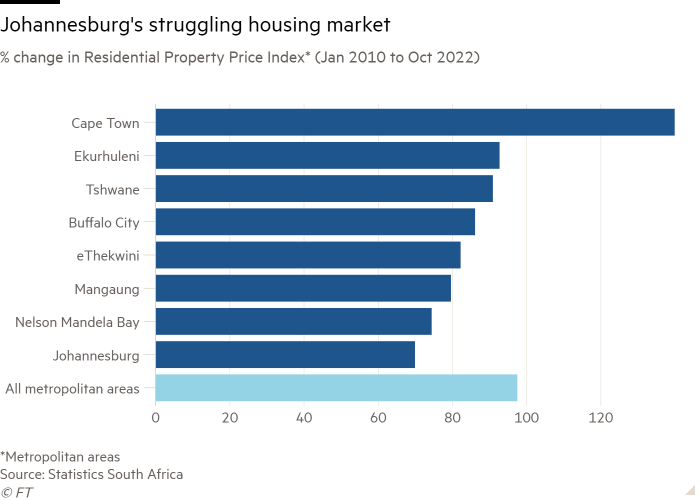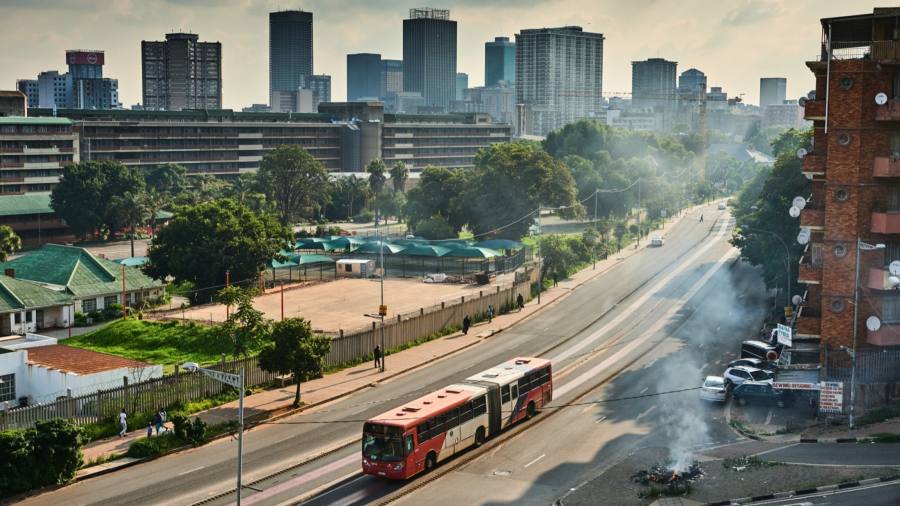When Roesdien Hendricks warns that his community in the heart of Johannesburg is about to explode because of illegal gold miners who scare away the police, strip power cables and divert water supplies, he is not exaggerating.
As “Zama-zamas” blow up a historic gold reef that was at the core of nearly 140 years of exploitation that made the South African metropolis one of Africa’s greatest cities, they are venturing so close to gas lines that they risk causing a fiery blast that would devastate the entire suburb of Riverlea.
“We are sitting on gold, literally . . . but we are also sitting on a timebomb, waiting to explode,” said the 50-year-old activist.
Hendricks added that the police were “useless” at stopping the turf battles between rival miners whose gunfights punctuated the night. “We are told, ‘we can’t come, we are scared of the violence in your area’.”
Riverlea’s troubles epitomise a growing sense of lawlessness and infrastructural collapse in South Africa’s biggest city, a reflection of a national malaise of severe rolling blackouts and decline under the ruling African National Congress of President Cyril Ramaphosa.
Riverlea is just south of where gold was first discovered in Johannesburg in 1886, leading to the rise of what is still a brash and proud commercial city that attracts migrants from across Africa.
Today it is home to the continent’s biggest banks, advanced data centres and commercial activity that drives almost a fifth of South Africa’s gross domestic product. But this industrial heart is beset by political turmoil and a financial crisis in its municipal agencies.
This year the ANC took back control of the city in dubious backroom dealing after an opposition-led coalition collapsed in acrimony. Analysts said the ANC was now the power behind a mayor plucked from a small party in an arrangement that was more about dividing up lucrative public contracts than restoring municipal pride. “It’s like someone chewed the place up and spat it out,” Hendricks said.

The rot has grown so bad that in the city’s historic centre last week, Stephen Moreo, the Anglican bishop of Johannesburg, used a Palm Sunday procession to deplore the rubbish that covered the streets outside the Cathedral of St Mary the Virgin, where Desmond Tutu once served as dean.
“I have never seen something like this, especially in a world-class African city,” Moreo said, as he preached alongside a pile of trash in his mitre and vestments. “This can’t be — we are unable to use entrances to our worshipping place,” he added.
City officials were shamed into coming to clean up the next day. But elsewhere, thieves act with impunity to cut down traffic-light poles with angle-grinders to sell them for scrap.
“Our operations are being sabotaged by syndicates . . . everything is being stripped and stolen to be sold for next to nothing of its replacement value,” Johannesburg’s roads agency said in March. “Zama-zamas are also digging their mining tunnels underneath our city of gold’s roads, causing sinkholes and collapsing roads.”
The urban blight is repeated across South Africa’s struggling economy, which has failed to keep pace with population growth. “Johannesburg has decayed, but that is the state of many South African cities,” said Lukhona Mnguni, co-founder of Rivonia Circle, a think-tank.
The deterioration has crossed South Africa’s post-apartheid urban divide and breached the wealthy suburbs sprawled across Johannesburg’s north, which are enduring water shortages and sewage failures.

Cape Town, South Africa’s second-largest city that is run by the main opposition Democratic Alliance, is becoming more attractive for wealthy “semigrants” who can afford to move.
In one sign of an exodus to the Cape, Koketso Moeti, a Johannesburg resident, has been picking up bargains in an ever-growing number of house-moving sales. “I’ve got two free pianos, for example. The most ridiculous things,” she said.
“Between water and electricity [outages], it has been bad for people,” Moeti added. “The dysfunction has grown so much, even in places that used to function.”
Even simple roadworks to fix power or water supplies are left unfinished by a web of contractors, she says. “This city is full of craters . . . it makes no sense to have one company do the repair and another company to fill the hole.”
Those who stay are increasingly relying on private operators to replace municipal services.

A “pothole patrol” has been sponsored by Discovery, an insurer. The city’s roads agency is even asking businesses to connect nearby traffic lights to the back-up generators that they have had to install in their buildings to survive outages imposed by the Eskom power monopoly.
“It is spreading north for everyone to see. Traffic lights don’t work, verges don’t get cut, the street lights are out . . . driving at night in Johannesburg is horrendous,” said Gerald Garner, an author and city guide.
“If you want to fix Johannesburg, you must fix its heart,” which is an important transport conduit as well as a repository of the city’s history from the Victorian gold rush to the rise of democracy, Garner said. “The majority of Johannesburg’s people move through the inner city. Millions of South Africans, who are voters, use the inner city.”
This means rising anger over Johannesburg’s decay will be a significant factor in national elections next year, where the ANC are in danger of losing the governing majority that it has held since 1994.
The liberation movement will find it hard to win nationally without victory in Gauteng, the country’s most populous province that includes Johannesburg.
Ruwayda, Hendricks’s wife, said that she would like to leave Riverlea and Gauteng for Cape Town. But she must stay to look after her ailing mother, who depends on an oxygen machine that is another casualty of the city’s collapse.
“When there is cable theft, the power can be out for three to four days,” she said. “She looks fine to you or me — but her heart is labouring.”
